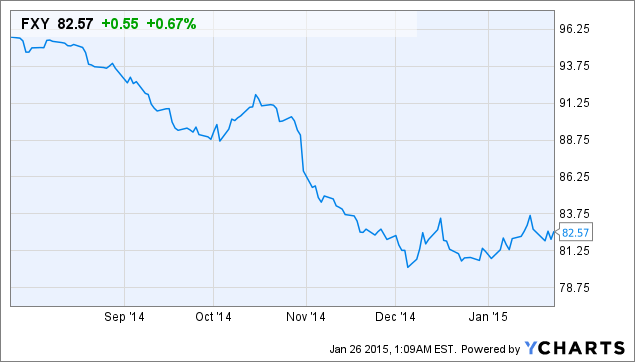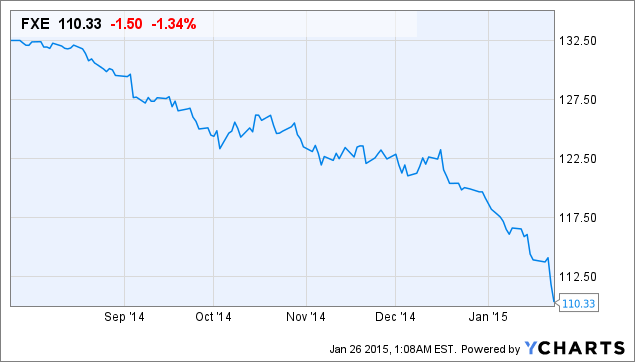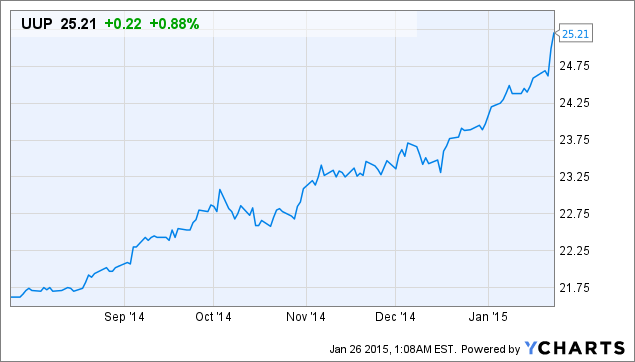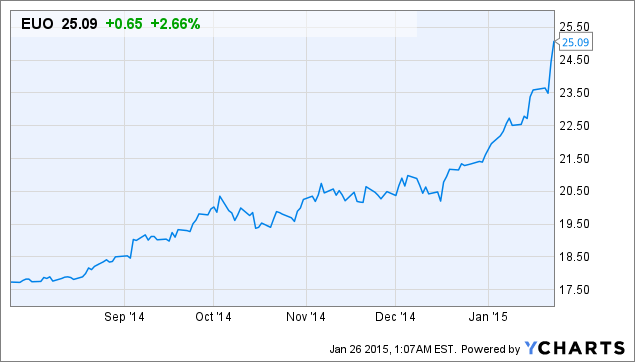Scalper1 News



 Summary Greek election result and what it means for investors. European Central Bank quantitative easing and what to expect from the Euro. Recommendations to profit from these moves. This is a very unusual article for me, as my regular readers will know, since I generally invest long term. I authored another similar article in March of 2012 about the Greek debt situation. This is a special situations and I believe that such opportunities should not be ignored. I also write a series about hedging and this particular situation falls neatly into that category. There are two issues coming out of Europe over the last week: the European Central Bank [ECB] quantitative easing [QE] program and the Greek election results this Sunday, January 25, 2015. The QE announcement was expected, but the size of the program was about twice what was being rumored and caught the markets by surprise. The Greek election turned out about the way early polls implied but still has the potential to create instability on the continent. The two events taken together sends a message that we should be cautious when investing in Europe. But, then again, there may also be some opportunity to profit. Greek Election With about 90 percent of the votes counted it is projected that the Syriza Party will win the election and come away with a total of 149 of the 300 seats in Parliament. That includes the 50 extra seats given to the winning party and leaves Syriza leader, Tsipras, two seats short of an outright majority. That means that Tsipras will need to entice one of the other smaller parties into forming a government. And that is likely to lead to compromise; on what, I do not know. But without having won outright control, Tsipras may not be able to move as far or as fast as his constituents are expecting. That may be good because it will give Tsipras an excuse and may give him more time to negotiate whatever the eventual agreement with the European Union [EU], ECB and the International Monetary Fund [EMF] from which past bailouts have come. The bottom line, in my humble opinion, is that this creates uncertainty in the EZ. Some expect Greek to exit the EU, others expect at least some Greek debt forgiveness, while others expect Greece leaders to cave into the demands of continued austerity. No one knows for sure what will happen. This uncertainty is likely to further undermine the already weakening Euro currency against other major currencies, especially the U.S. dollar. However, since the worst possible outcome of outright control by Syriza (worst case for the EZ) did not occur, the initial impact could be muted. ECB and QE Investors who own shares of companies that are either domiciled in the Euro Zone [EZ] or conduct significant business there, should consider taking steps to protect holdings from what I expect to be additional downside risk from currency translations. The ECB announced last week its intention to initiate a 1 trillion euro quantitative easing program in March 2015 expected to last through at least September of 2016. Now that the initial impact from the program announcement has taken its toll, we may see the Euro drift sideways unless my interpretation of the Greek election is off. Recall what happened to the Japanese Yen relative to the US dollar after the US ended its QE3 and the Japanese Central Bank announced shortly after that it would expand its QE program in late October of last year. There was an initial steep sell off over the first few days followed by a more gradual, but still significant, continued decline in the value of the Yen over the next four weeks. The Yen has continued to trade with a range since that time, but weekly moves are can still be volatile. See the chart of CurrencyShares Japanese Yen ETF (NYSEARCA: FXY ) below. FXY data by YCharts The Euro has been in a downtrend for the last six months (see chart of the CurrencyShares Euro ETF (NYSEARCA: FXE ) below), but the rate of decent increased about the middle of December when Draghi of the ECB indicated that QE in the EZ was coming soon. During this period it was widely accepted that the ECB would initiate a QE program in the range of 500 billion Euros. After the announcement of one trillion Euros hit on January 22, the Euro fell to an 11-year low near $1.1 / Euro. But the program has not even begun yet and will not get started until March! FXE data by YCharts A prolonged QE program aimed at weakening the Euro against the U.S. dollar and other major currencies will, in my opinion, be successful to the extent that the Euro will weaken further. Of course, the idea is that a weakening Euro will make EZ produced goods more competitive in the global marketplace; hence, increasing demand for EZ goods, creating jobs, increasing GDP and moving inflation up a notch or two. The problem is that other central banks are not likely to sit idly by and do nothing. As a matter of fact, both Canada and Denmark cut rates in the last week and Japan is determined to weaken the Yen further; others will likely follow. In other words, the ECB will probably be successful in weakening the Euro against the U.S. dollar and create inflation, but the other goals are less certain. The U.S. Federal Reserve Bank [FED] is unlikely to take further QE actions as such a move could be construed as a retaliatory move. That could move the world dangerously closer to an all-out currency war; something no one wants or needs. Thus, even with short-term U.S. interest rates pegged near zero, the U.S. dollar is more likely to continue to strengthen against other currencies, especially the Euro. Before I make my recommendations I must stress that using leveraged ETFs is always a very short-term strategy. Holding leveraged ETFs long-term, much more than a week, is generally a losing proposition. If you can’t monitor your positions at least once a day, please don’t consider this trading strategy. Unleveraged ETFs are less volatile and can be held longer. Recommendations PowerShares US Dollar Bullish ETF (NYSEARCA: UUP ) is an unleveraged US Dollar Index ETF that goes up when the US dollar rises relative to a basket of other major currencies, including the euro. Daily average volume is 1.7 million shares, a very important point because you don’t want to trade an ETF that is thinly traded and run the risk not being able to close out a position when you want. My theory is that the uncertainty created by the Greek elections combined with the ECB move with put downward pressure on the Euro over the next few weeks and potentially even longer. I own UUP now and may add to my position, primarily as a hedge against currency translation losses by companies that do extensive business in Europe. This position has done well and I expect the trend to continue (see UUP chart below). UUP data by YCharts ProShares Ultra Short Euro ETF (NYSEARCA: EUO ) is a double-leveraged inverse ETF on the euro that goes down twice the amount that the US dollar increases relative to the euro. EUO daily average volume is about 1.3 million shares, thus providing adequate liquidity also. The unleveraged short Euro ETFs did not have adequate trading volume to warrant a recommendation. I do not hold any EUO at this time but plan to take a short-term position within the next week. This is more of a momentum play and not my usual cup of tea, so my position will be very small and short-lived. The trend for EUO has been strong and I believe that there is still more to come, but for how long I do not know (see EUO chart below). EUO data by YCharts Again, this is meant as a means to protect at least some of what you have, not as a get-rich-quick scheme. Don’t plan to hold the position beyond the point when the prices begin to turn against you. It would be prudent to use trailing stops to protect your capital. A drop of more than five percent is significant, thus I would keep my trailing stops at five percent. The leveraged ETFs are very risky securities, and can lose you money if held long-term. It is the nature of how these securities are designed. They can be solid performers over relatively short periods only. Be careful out there! Additional disclosure: I intend to initiate a short-term position in EUO this week. Scalper1 News
Summary Greek election result and what it means for investors. European Central Bank quantitative easing and what to expect from the Euro. Recommendations to profit from these moves. This is a very unusual article for me, as my regular readers will know, since I generally invest long term. I authored another similar article in March of 2012 about the Greek debt situation. This is a special situations and I believe that such opportunities should not be ignored. I also write a series about hedging and this particular situation falls neatly into that category. There are two issues coming out of Europe over the last week: the European Central Bank [ECB] quantitative easing [QE] program and the Greek election results this Sunday, January 25, 2015. The QE announcement was expected, but the size of the program was about twice what was being rumored and caught the markets by surprise. The Greek election turned out about the way early polls implied but still has the potential to create instability on the continent. The two events taken together sends a message that we should be cautious when investing in Europe. But, then again, there may also be some opportunity to profit. Greek Election With about 90 percent of the votes counted it is projected that the Syriza Party will win the election and come away with a total of 149 of the 300 seats in Parliament. That includes the 50 extra seats given to the winning party and leaves Syriza leader, Tsipras, two seats short of an outright majority. That means that Tsipras will need to entice one of the other smaller parties into forming a government. And that is likely to lead to compromise; on what, I do not know. But without having won outright control, Tsipras may not be able to move as far or as fast as his constituents are expecting. That may be good because it will give Tsipras an excuse and may give him more time to negotiate whatever the eventual agreement with the European Union [EU], ECB and the International Monetary Fund [EMF] from which past bailouts have come. The bottom line, in my humble opinion, is that this creates uncertainty in the EZ. Some expect Greek to exit the EU, others expect at least some Greek debt forgiveness, while others expect Greece leaders to cave into the demands of continued austerity. No one knows for sure what will happen. This uncertainty is likely to further undermine the already weakening Euro currency against other major currencies, especially the U.S. dollar. However, since the worst possible outcome of outright control by Syriza (worst case for the EZ) did not occur, the initial impact could be muted. ECB and QE Investors who own shares of companies that are either domiciled in the Euro Zone [EZ] or conduct significant business there, should consider taking steps to protect holdings from what I expect to be additional downside risk from currency translations. The ECB announced last week its intention to initiate a 1 trillion euro quantitative easing program in March 2015 expected to last through at least September of 2016. Now that the initial impact from the program announcement has taken its toll, we may see the Euro drift sideways unless my interpretation of the Greek election is off. Recall what happened to the Japanese Yen relative to the US dollar after the US ended its QE3 and the Japanese Central Bank announced shortly after that it would expand its QE program in late October of last year. There was an initial steep sell off over the first few days followed by a more gradual, but still significant, continued decline in the value of the Yen over the next four weeks. The Yen has continued to trade with a range since that time, but weekly moves are can still be volatile. See the chart of CurrencyShares Japanese Yen ETF (NYSEARCA: FXY ) below. FXY data by YCharts The Euro has been in a downtrend for the last six months (see chart of the CurrencyShares Euro ETF (NYSEARCA: FXE ) below), but the rate of decent increased about the middle of December when Draghi of the ECB indicated that QE in the EZ was coming soon. During this period it was widely accepted that the ECB would initiate a QE program in the range of 500 billion Euros. After the announcement of one trillion Euros hit on January 22, the Euro fell to an 11-year low near $1.1 / Euro. But the program has not even begun yet and will not get started until March! FXE data by YCharts A prolonged QE program aimed at weakening the Euro against the U.S. dollar and other major currencies will, in my opinion, be successful to the extent that the Euro will weaken further. Of course, the idea is that a weakening Euro will make EZ produced goods more competitive in the global marketplace; hence, increasing demand for EZ goods, creating jobs, increasing GDP and moving inflation up a notch or two. The problem is that other central banks are not likely to sit idly by and do nothing. As a matter of fact, both Canada and Denmark cut rates in the last week and Japan is determined to weaken the Yen further; others will likely follow. In other words, the ECB will probably be successful in weakening the Euro against the U.S. dollar and create inflation, but the other goals are less certain. The U.S. Federal Reserve Bank [FED] is unlikely to take further QE actions as such a move could be construed as a retaliatory move. That could move the world dangerously closer to an all-out currency war; something no one wants or needs. Thus, even with short-term U.S. interest rates pegged near zero, the U.S. dollar is more likely to continue to strengthen against other currencies, especially the Euro. Before I make my recommendations I must stress that using leveraged ETFs is always a very short-term strategy. Holding leveraged ETFs long-term, much more than a week, is generally a losing proposition. If you can’t monitor your positions at least once a day, please don’t consider this trading strategy. Unleveraged ETFs are less volatile and can be held longer. Recommendations PowerShares US Dollar Bullish ETF (NYSEARCA: UUP ) is an unleveraged US Dollar Index ETF that goes up when the US dollar rises relative to a basket of other major currencies, including the euro. Daily average volume is 1.7 million shares, a very important point because you don’t want to trade an ETF that is thinly traded and run the risk not being able to close out a position when you want. My theory is that the uncertainty created by the Greek elections combined with the ECB move with put downward pressure on the Euro over the next few weeks and potentially even longer. I own UUP now and may add to my position, primarily as a hedge against currency translation losses by companies that do extensive business in Europe. This position has done well and I expect the trend to continue (see UUP chart below). UUP data by YCharts ProShares Ultra Short Euro ETF (NYSEARCA: EUO ) is a double-leveraged inverse ETF on the euro that goes down twice the amount that the US dollar increases relative to the euro. EUO daily average volume is about 1.3 million shares, thus providing adequate liquidity also. The unleveraged short Euro ETFs did not have adequate trading volume to warrant a recommendation. I do not hold any EUO at this time but plan to take a short-term position within the next week. This is more of a momentum play and not my usual cup of tea, so my position will be very small and short-lived. The trend for EUO has been strong and I believe that there is still more to come, but for how long I do not know (see EUO chart below). EUO data by YCharts Again, this is meant as a means to protect at least some of what you have, not as a get-rich-quick scheme. Don’t plan to hold the position beyond the point when the prices begin to turn against you. It would be prudent to use trailing stops to protect your capital. A drop of more than five percent is significant, thus I would keep my trailing stops at five percent. The leveraged ETFs are very risky securities, and can lose you money if held long-term. It is the nature of how these securities are designed. They can be solid performers over relatively short periods only. Be careful out there! Additional disclosure: I intend to initiate a short-term position in EUO this week. Scalper1 News
Scalper1 News